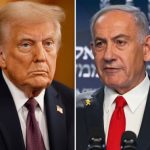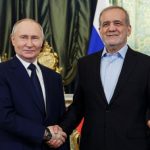‘I may do it, I may not do it,’ US president says as Tehran reportedly prepares to strike US bases in response
Donald Trump said he had not decided whether or not to take his country into Israel’s new war, as Iran’s supreme leader said the US would face “irreparable damage” if it deployed its military to attack.
Ayatollah Ali Khamenei said Israel had made a “huge mistake” by launching the war, in his first comments since Friday. “The Americans should know that any US military intervention will undoubtedly be accompanied by irreparable damage,” he said in a statement read out by a presenter on state TV.
Tehran was preparing missiles and other equipment to strike US bases in the region if Washington joined the war, the New York Times reported, citing US intelligence officials.
Hours later, Trump said Iranian officials had reached out to request a meeting and proposed a visit to the White House.
He told reporters on the White House lawn that he felt “it’s very late to be talking” but he had not yet made a final decision about entering the war. “I may do it, I may not do it. I mean, nobody knows what I’m going to do,” he said.
That lack of clarity about what comes next may extend to the president himself, who was still in deal-making mode, one ally said. The US is understood to want to keep all its options open to exert maximum pressure on Tehran.
It was moving air tankers for midair refuelling to Spain and Greece, where they could be used to supply B-2 bombers on a long run from the Whiteman airbase in Missouri to Iran.
It is understood thatno request has been put to the UK for use of the Diego Garcia airbase in the Indian Ocean for a B-2 bombing runor of the Akrotiri airbase in Cyprus for the refuelling aircraft, though the latter is considered likely.
Other US military assets are on their way. The Pentagon ordered the USS Nimitz aircraft carrier to sail from Singapore to the Middle East, which is expected to take between five and seven days. The USS Carl Vinson is already in the Arabian Sea.
Qatar and Oman were trying to mediate a ceasefire, the Jerusalem Post reported, hours after at least one aircraft associated with the Iranian government flew to Muscat in Oman, flight tracking showed.
Iran sent a message that it was willing to negotiate a deal with the US, but Israel needed to “calm things down”, a source told the Jerusalem Post.
Trump’s claim that Iranians had offered to come to the White House for talks prompted an enraged response from Iran’s mission to the UN. “No Iranian official has ever asked to grovel at the gates of the White House,” the mission posted on a social media account.
The foreign ministers of the UK, France and Germany are planning to meet their Iranian counterpart, Abbas Araghchi, in Geneva on Friday in what could represent a potential diplomatic breakthrough after five days of Israeli bombing.
Final confirmation from Tehran is still pending, but if confirmed it would represent the first face-to-face diplomatic meeting since the crisis began.
In a social media post late on Wednesday, Aragchi wrote that Iran “remain[s] committed to diplomacy. As before, we are serious and forward-looking in our outlook.”
The talks in Geneva will focus on how Iran is willing to reduce or close its nuclear program, and will also be attended by the EU foreign policy chief, Kaja Kallas.
But Aragchi has refused to meet Donald Trump’s envoy, Steve Witkoff, on the grounds that the US is supporting Israel’s attacks.
TheTrump administrationhad initially distanced itself from the war, saying Israel had acted alone, but in recent days it has stepped up its rhetoric and its military presence in the Middle East.
Iran’sFordow nuclear facilityis at the heart of demands for the US to join the war, both in Israel and from hawks in Washington. Damage from strikes on other facilities could be repaired within months, Israeli military officials and nuclear experts say. Destroying or crippling Fordow would have much more of a long-term impact.
It is buried deep below a mountain near the holy city of Qom, and the only munitions that could possibly damage or destroy it are the most powerful US bunker-buster bombs, which only US B-2s can carry.
Israel’s national security adviser, Tzachi Hanegbi, said the war had been an entirely Israeli campaign but it “will not end without damaging Fordow”, in an interview with Israel’s Channel 12 television.
If the US does not join, Israel may still have military options but they would be riskier and more complicated. It could fly in special operations troops for a ground operation, like one that targeted a missile factory in Syria last year, or disable Fordow by attacking critical support systems such as its power supply.
Israel says it launched the war in self-defence, to destroy Iran’s nuclear programme, but Netanyahu and several ministers have made no secret of their desire for regime change.
Trump reportedly vetoed an Israeliplan to assassinate Khamenei, and critics have questioned why Israel targeted civilian institutions such as the state broadcaster.
On Wednesday, the defence minister, Israel Katz, said Israel was bombing “symbols of power” in Iran and suggested the regime could be in its last days.
“A tornado is sweeping through Tehran,” he wrote in a post on X. “Symbols of power are being bombed and collapsing, from the broadcasting authority and soon other targets, and masses of residents are fleeing. This is how dictatorships collapse.”
The escalating conflict has prompted a growing international chorus of concern. The Russian president, Vladimir Putin, offered to mediate between Iran and Israel, after one of his top diplomats urged Washington not to consider “speculative options” for intervention.
On a sixth night of attacks, Israel bombed a site that manufactured uranium centrifuges and also said it had targeted a missile component factory and destroyed five attack helicopters.
Iran’s military has been battered but not fully destroyed. An advanced Israeli drone was shot down on Wednesday, despite Israel claiming control of the skies over western Iran and Tehran. Overnight, Iran fired 15 missiles at Israel.
The International Atomic Energy Agency (IAEA) confirmed that Israeli strikes had hit two centrifuge productions in Iran, one in the capital and another just outside it.
Iran has reported at least 224 deaths from Israeli attacks, mostly civilians, although it has not updated that toll for several days. A US-based watchdog, Human Rights Activists in Iran, says at least 585 people have been killed and more than 1,300 injured.
Iranian attacks on Israel have killed 24 people, all civilians. Israeli air defences have intercepted most of the 400 missiles fired by Tehran, with only about 10% hitting targets inside the country.
Israel could become more vulnerable if the war continues much longer as supplies of its most effective air-defence missiles are running low, the Wall Street Journal has reported, citing a US official.
Its Arrow interceptors are complex missiles that cost several million dollars each, and they have a long production process.
Although the US has been supporting Israel’s defences with Thaad ground-based systems, interceptions by F-16 jets and missiles launched by the navy, it does not have unlimited supplies of these defensive systems either.
Iran is thought to still have a substantial proportion of the estimated 2,000 missiles that were in its arsenal at the start of the war. Israeli strikes have focused on launcher systems that are needed to fire them.
Additional reporting by Quique Kierszenbaum













